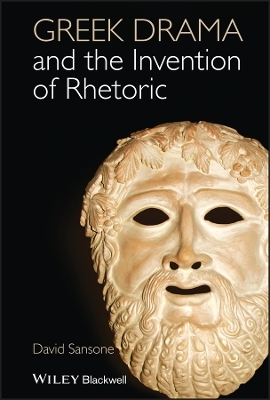
Greek Drama and the Invention of Rhetoric
Wiley-Blackwell (Verlag)
978-1-118-35708-8 (ISBN)
GREEK DRAMA and the Invention of Rhetoric “An impressively erudite, elegantly crafted argument for reversing what ‘everybody knows’ about the relation of two literary genres that played before mass audiences in the Athenian city state.”
Victor Bers, Yale University
“Sansone’s book is first-rate and should be read by any scholar interested in the origins of Greek rhetorical theory or, for that matter, interested in Greek tragedy. That Greek tragedy contains elements properly described as rhetorical is familiar, but Sansone goes far beyond this understanding by putting Greek tragedy at the heart of a counter-narrative of those origins.”
Edward Schiappa, The University of Minnesota
This book challenges the standard view that formal rhetoric arose in response to the political and social environment of ancient Athens. Instead, it is argued, it was the theater of Ancient Greece, first appearing around 500 BC that prompted the development of formalized rhetoric, which evolved soon thereafter. Indeed, ancient Athenian drama was inextricably bound to the city-state’s development as a political entity, as well as to the birth of rhetoric. Ancient Greek dramatists used mythical conflicts as an opportunity for staging debates over issues of contemporary relevance, civic responsibility, war, and the role of the gods.
The author shows how the essential feature of dialogue in drama created a ‘counterpoint’—an interplay between the actor making the speech and the character reacting to it on stage. This innovation spurred the development of other more sophisticated forms of argumentation, which ultimately formed the core of formalized rhetoric.
David Sansone is Professor Emeritus of Classics at the University of Illinois. A former editor of the journal Illinois Classical Studies, he has also served on the editorial boards of Classical Philology and Bryn Mawr Classical Review, and been a member of the Board of Directors of the American Philological Association. He is the author of Greek Athletics and the Genesis of Sport (1988), Plutarch: Lives of Aristeides and Cato (1989) and Ancient Greek Civilization (Wiley-Blackwell, 2009).
Preface Part One: What Drama Does and How It Does It
1. Setting the Stage
2. Seeing is Believing
3. The Muse Takes a Holiday
4. “It’s counterpoint,” he countered, and pointed.
5. Illusion and Collusion
6. Reaction Time
Part Two: The Second Stage: The Invention of Rhetoric
7. Paradigm Shift Happens
8. Perhaps You Will Object
9. Putting the Accuser on Trial
Works Cited
| Verlagsort | Hoboken |
|---|---|
| Sprache | englisch |
| Maße | 160 x 239 mm |
| Gewicht | 494 g |
| Themenwelt | Geisteswissenschaften ► Geschichte |
| Geisteswissenschaften ► Sprach- / Literaturwissenschaft ► Anglistik / Amerikanistik | |
| Geisteswissenschaften ► Sprach- / Literaturwissenschaft ► Latein / Altgriechisch | |
| Geisteswissenschaften ► Sprach- / Literaturwissenschaft ► Literaturwissenschaft | |
| Geisteswissenschaften ► Sprach- / Literaturwissenschaft ► Sprachwissenschaft | |
| ISBN-10 | 1-118-35708-6 / 1118357086 |
| ISBN-13 | 978-1-118-35708-8 / 9781118357088 |
| Zustand | Neuware |
| Haben Sie eine Frage zum Produkt? |
aus dem Bereich


